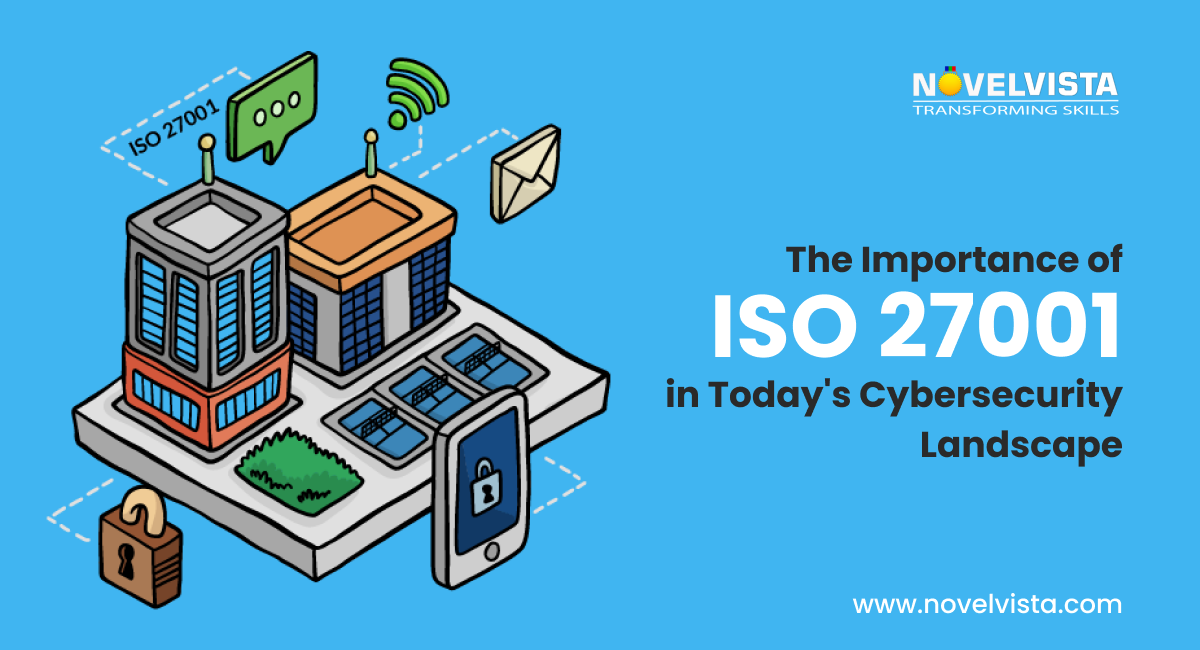Enroll Now and Get Upto 30% Off
* Your personal details are for internal use only and will remain confidential.

Last updated 23/01/2025

Businesses face previously unheard-of cybersecurity issues in today's fast-paced digital world, when every click, transaction, and conversation invariably involves sending sensitive data. Escalating sophistication of cyber threats along with growing scrutiny from regulating bodies has made robust information security practices non-negotiable. The internationally recognized standard for ISMS, namely ISO 27001, has emerged as a cornerstone for businesses that want to safeguard their data and maintain trust among stakeholders. This blog explores why ISO 27001 is important in the modern cybersecurity landscape, including the pros of implementation, the steps to implement, and its role in furthering digital resilience. The International Organization for Standardization (ISO) developed the information security standard ISO 27001, formally known as ISO/IEC 27001:2022, which offers a structure and principles for creating, putting into practice, and overseeing an information security management system. ISO 27001 is considered to be a part of the ISO/IEC 27000 family of standards dealing with information security. It offers a comprehensive framework for information protection using a risk-based approach. The standard encompasses policies, procedures, and controls that address potential vulnerabilities to facilitate the confidentiality, integrity, and availability of organizational data. Unlike 'piecemeal security', the ISO 27001 approach brings about security within the organizational culture. Being a process-driven approach, it makes it flexible and scalable, and businesses of all shapes and sizes and across all industry sectors can implement the standard. The digital landscape is perpetually changing, and so are the cyber threats. Advanced ransomware, phishing attacks, and social engineering can now target vulnerabilities within organizational systems, infrastructure, and human behavior. Beyond the financial loss, consequences of such attacks include regulatory penalties, operational disruptions, and eroded trust among clients and partners. According to IBM’s Cost of a Data Breach Report 2023, the average cost of a data breach in 2023 was USD $4.45 million, a 2.3% increase from 2022’s cost of $4.35 million. In these regards, ISO 27001 works as a proactive measure to help an organization mitigate risks before they escalate. A structured procedure that integrates security into every sector of an organization's operations is necessary for ISO 27001 certification. Usually, the procedure consists of: Although obtaining certification takes work, the long-term advantages greatly exceed the initial process. A mid-sized financial services company implemented ISO 27001 to comply with regulatory requirements and enhance client trust. Within two years, the organization reported a 30% reduction in security incidents and a 15% increase in client retention due to improved confidence in their data protection measures. A healthcare provider, which handled confidential patient information, complained about difficulties in maintaining compliance with the HIPAA standard. Through adopting ISO 27001, the provider streamlined its security practices and ensured compliance with HIPAA regulations as well as protecting patient information from unauthorized access. ISO 27001 is often compared with other security frameworks, for example, NIST and COBIT. While all of them are worth discussing, ISO 27001 has always had a cut over competitors in terms of its global recognition, a comprehensive risk-based approach, and the "Continuous Improvement" stipulation. It can be applied across almost every kind of industry or sizes of organizations. By adjusting to new issues like cyberattacks powered by artificial intelligence (AI) and the Internet of Things (IoT), ISO 27001 continues to stay relevant as the digital world changes. The standard's focus on flexibility guarantees that businesses can successfully handle these emerging risks. With the help of the above details, it can be easily understood that ISO 27001 is more than just a compliance requirement in today’s strategic imperative businesses. Its approach performed for stakeholders to gain their trust, regulatory compliance, and risk management provides businesses a strong barrier against online attacks. For businesses which are trying to succeed in the digital era, ISO 27001 is more than preventing threats or breaches, it's also about creating a culture of security and maintaining long-term resilience. Businesses also gain confidence in handling the complexities by using this standard.What is ISO 27001?
Cyber Security
Major Security Threats for Organizations:
The Benefits of ISO 27001
ISO 27001 Implementation: A Comprehensive Guide Approach
Real-World Applications and Success Stories
Case Study 1: A Financial Services Firm
Case Study 2: Healthcare Provider
Comparing ISO 27001 With Other Standards
Future Cyber Security with ISO 27001
Moving Forward
Vikas is an Accredited SIAM, ITIL 4 Master, PRINCE2 Agile, DevOps, and ITAM Trainer with more than 20 years of industry experience currently working with NovelVista as Principal Consultant.
* Your personal details are for internal use only and will remain confidential.